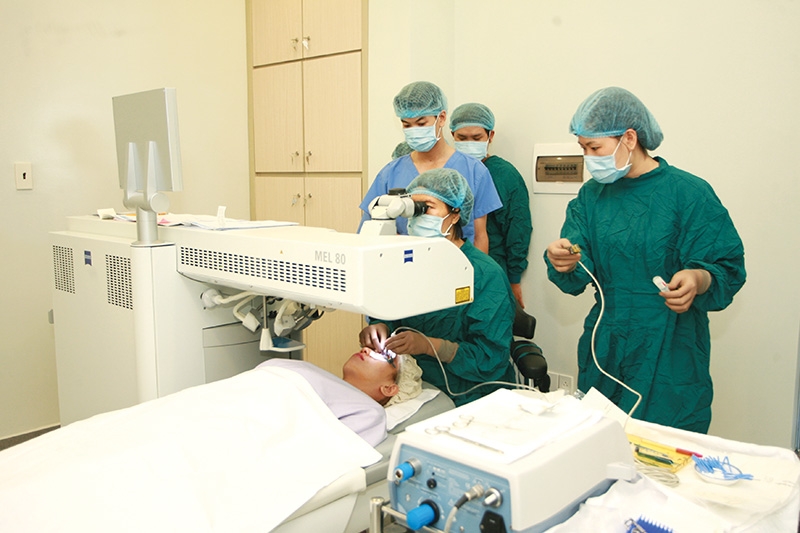Opportunities for healthtech to fill unmet market demand
 |
| Eric Johnson from law firm FreshfieldsBruckhaus Deringer LLP |
There are a number of factors at play that will simultaneously place increasing pressure on the existing public healthcare system, and the government budgets that fund it. These challenges will create significant opportunities for foreign investment by the private sector in healthcare in the coming years.
While Vietnam currently enjoys favourable demographics with its young population, which has been a factor driving economic growth and foreign investment in recent years, over the next two decades the ageing of Vietnam’s population is expected to accelerate as today’s 30 year olds get older and overall population growth slows. The ageing of the population will continue to fuel the rising demand for healthcare services. In addition to ageing, growing affluence will continue to increase demand. As the middle class in Vietnam continues to expand as a result of the ongoing economic growth, this segment of the population is expected to seek out high-quality healthcare services, which have traditionally been available primarily at the top-tier government-run hospitals in the major urban areas.
These hospitals are already under pressure and suffer from overcrowding, lack of supplies, and qualified doctors. The rapid urbanisation accompanying Vietnam’s economic growth exacerbates these issues, creating space for private healthcare businesses to step in to fill the void.
In the face of this rising demand, the government will need to explore multiple avenues to fund the expansion and development of the healthcare sector. The private sector has an important role to play, and we must focus on the opportunities and challenges facing hospitals and clinics in Vietnam, and look forward to a future where technology-enabled private healthcare companies play a greater role in serving unmet market demand.
Hospitals and clinics
The major government hospitals in the large cities remain the top destinations for Vietnamese seeking the highest-level healthcare available. However, the major urban hospitals are plagued by overcrowding and the lack of modern medical equipment and the latest drugs. This state of affairs creates a significant gap that private hospitals and clinics are poised to fill over the coming years, and significant opportunities for foreign investors to participate in Vietnam’s economic growth.
One commercial hurdle that private hospitals face is the perceived reputational gap between the top-tier major urban public hospitals and privately-run hospitals and clinics. There are many reasons for this gap we need not examine here, but suffice it to say that the private sector is making significant progress in closing this gap, as shown by the rapid development of major private hospital chains such as Vinmec and Hoan My, both of which have received foreign investment in recent years.
Another commercial hurdle to increased foreign investment in private hospitals and clinics is the small number of true national chains which successfully operate multiple facilities across the country. This is because for many investors, an investment in a single hospital asset is often not attractive, either because the growth potential of any single hospital is limited when compared to the growth potential of a national chain or the deal size is too small.
There are of course, many foreign investors who are interested in single hospitals, and there have been reports in the press that owners of the Hanoi French Hospital in Hanoi and the FV Hospital in Ho Chi Minh City may be seeking exits. In addition, the market has recently seen VinaCapital invest in Thu Cuc International General Hospital, which currently operates one general hospital and a number of clinics in Hanoi, indicating potential expansion plans. It has also been rumoured in the press that Family Medical Practice, which operates a small chain of clinics in the country, is seeking investors.
In future we expect to see continued foreign investment into private hospital and clinic businesses, and the continued push by these businesses to develop into national chains. This is true for general hospitals and clinics, but also for specialised hospitals and clinics (for example, stroke, dental, and other specialised fields), which are still relatively rare in Vietnam and could present significant growth investment opportunities.
Despite the favourable economic tailwinds in this sector, there are a number of issues facing foreign investors. One key hurdle is the current prohibition on foreign ownership of any business engaged in pharmaceutical distribution. This is a problem because a majority of pharmaceutical sales in Vietnam still occur in hospitals, and these sales often make up a significant portion of a hospital’s revenues.
In order to address this, the government should consider easing the foreign investment restrictions applicable to pharmaceutical distribution, by allowing some level of foreign investment or creating a carve-out for pharmaceutical distribution businesses that are being operated as part of a private hospital or clinic.
Another major problem for all healthcare businesses in Vietnam is the difficulty in recruiting qualified doctors, particularly in specialised fields. Many of the best doctors in the country are reluctant to work for private hospitals as they may want to work for their own clinic after hours, which is easier to do when employed at a public hospital.
Being employed at one of the top public hospitals also carries significant reputational benefits. Foreign doctors can practice here, but it is burdensome to recruit foreign doctors and there are practical issues such as language barriers. There is no quick solution to this, but foreign investors should expect this issue to arise in most healthcare deals in Vietnam.
 |
| The government is making increasing attempts to attain adoption of digital technology in healthcare. Photo: Le Toan |
Healthtech and telemedicine
In light of the serious challenges facing the healthcare sector, tech-enabled healthcare services companies, or healthtech companies, will undoubtedly play a role in the development of the sector in the coming years. While it may be too early to predict what that role will look like, we can see some patterns begin to emerge even at these early stages.
The government has been encouraging healthcare digitalisation as a matter of policy for some years now. For example, the Ministry of Health (MoH) has issued a number of regulations designed to implement digitalisation of medical records and the improvement of IT systems in order to optimise Vietnam’s healthcare system and reduce pressure on the overcrowded top-tier urban hospitals.
Importantly, in addition to the efficiency benefits this digital transformation will bring, widespread digitalisation of the healthcare sector is also a precursor to a vibrant healthtech ecosystem.
Actual implementation of digitalisation has unfortunately been slow and uneven in practice, in large part due to funding constraints which can disincentivise public hospitals from spending capital on long-term digitalisation projects and the specialised IT teams needed to implement them.
Many private hospitals, which often have more resources, have invested in more advanced health management systems and other digitalisation projects in order to better compete with their peers, but private hospitals are not available to a large portion of the population and the vast majority of hospitals and clinics are still government run.
The government should continue to push for uniform adoption of digital technology in the healthcare sector, including electronic medical records and improvements to IT systems, to improve efficiency and lay the groundwork for healthtech innovation in Vietnam.
As this effort progresses, interesting opportunities for healthtech companies to step in and fill unmet market demand will increase.
The MoH has had telemedicine on its radar well before the pandemic began, issuing Circular No.47/2017 regulating telemedicine in Vietnam which became effective in 2018. The onset of the pandemic increased reliance on telemedicine – not only in Vietnam, but across the globe.
Viettel has reportedly launched its own telemedicine app, and there are a number of private startups entering the field as well. Many of these startups are in very early stages and are struggling to increase their customer base due to high service fees and lack of awareness.
However, this is an area to watch in Vietnam over the coming years, and a local consolidation could create companies that are big enough to enjoy economies of scale and attract much needed foreign investment from major strategic and financial investors.
What the stars mean:
★ Poor ★ ★ Promising ★★★ Good ★★★★ Very good ★★★★★ Exceptional
Themes: Healthcare Platform
- Hanoi intensifies airport monitoring amid Nipah disease risks
- Cosmetics rules set for overhaul under draft decree
- Policy obstacles being addressed in drug licensing and renewal
- Sanofi, Long Chau Pharmacy relaunch medicine blister pack collection initiative
- Takeda Vietnam awarded for ongoing support of Vietnam’s sustainability efforts
Related Contents
Latest News
More News
- IP alterations shape asset strategies for local investors (January 22, 2026 | 10:00)
- 14th National Party Congress: Vietnam - positive factor for peace, sustainable development (January 22, 2026 | 09:46)
- Japanese legislator confident in CPV's role in advancing Vietnam’s growth (January 22, 2026 | 09:30)
- 14th National Party Congress: France-based scholar singles out institutional reform as key breakthrough (January 21, 2026 | 09:59)
- 14th National Party Congress: Promoting OV's role in driving sustainable development (January 20, 2026 | 09:31)
- 14th National Party Congress affirms Party’s leadership role, Vietnam’s right to self-determined development (January 20, 2026 | 09:27)
- Direction ahead for low-carbon development finance in Vietnam (January 14, 2026 | 09:58)
- Vietnam opens arms wide to talent with high-tech nous (December 23, 2025 | 09:00)
- Why global standards matter in digital world (December 18, 2025 | 15:42)
- Opportunities reshaped by disciplined capital aspects (December 08, 2025 | 10:05)

 Tag:
Tag:




















 Mobile Version
Mobile Version